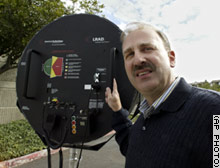 Below is a letter, from an e-mail, from a regular woman who's daughther was held for several days in a containment facility for temporary political prisoners, without access to telephones or legal representation. In New York. A facility run, apparently, by the Republican National Committee. The young lady made the mistake of walking though a park on a day when thousands of protesters were being rounded up and locked away, so that the Republican Convention could, eh, do its thing. Lots more of the kind from indymedia. Below is a letter, from an e-mail, from a regular woman who's daughther was held for several days in a containment facility for temporary political prisoners, without access to telephones or legal representation. In New York. A facility run, apparently, by the Republican National Committee. The young lady made the mistake of walking though a park on a day when thousands of protesters were being rounded up and locked away, so that the Republican Convention could, eh, do its thing. Lots more of the kind from indymedia.
At the same time, the NYPD is testing its new long range sound weapon. Well, really it was made for violent mobs in Iraq. But, hey, works great for random people walking on the street in New York too. Some of them might be Democrats.
I'm increasingly glad I now live out here in the free world, in a place where one is allowed to demonstrate, with police protection, and where there are free elections and human rights.
[ Politics | 2004-09-07 02:07 | | PermaLink ] More >
|
|
 Timothy Wilken: Timothy Wilken:This past Monday, I explained that the cause of all mistakes is ignorance. Universe is not certain — it is not structured as we humans have believed for countless centuries. Religion and the objective scientists were wrong. The physics of relativity and quantum mechanics describe a Universe in which things are not and cannot be perfect. A Universe in which, we humans are constrained to make all our choices without ALL the information. Mistakes are simply holes or gaps in our knowing — lapses in our understanding. Scientists and all humans who seek to know must embrace humility when they stand before the totality of Nature. The principle of Non-Allness is a fundamental law of nature. The fact that all actions occur in ignorance is a fundamental ‘knowing’ derived from the Principle of Non-Allness. And the first corollary of that principle — the Principle of Innocence is an even more important extension of our human ‘knowing’. If we understand that all errors are committed in innocence, then how we treat those who err will change forever. Therefore, the only proper response to mistakes is: 1) analysis to determine what wasn't known and who didn't know it, 2) education of those making the mistake, and if others were injured, 3) restitution by those causing the injury. ... Sometimes I am asked, but what about really evil people? If ignorance is the cause of all mistakes, then what was it that Hitler didn't know? And he goes on to provide some answers. See the article. Refreshing perspective. He's right.
[ History | 2004-09-07 21:44 | | PermaLink ] More >
|
|
 George Lakoff is a professor of cognitive linguistics who's specialty is dissecting "framing" in politics. Like, the ways in which conservatives and liberals position issues to support their respective moral worldviews. Brilliant man. George Lakoff is a professor of cognitive linguistics who's specialty is dissecting "framing" in politics. Like, the ways in which conservatives and liberals position issues to support their respective moral worldviews. Brilliant man. Language always comes with what is called "framing." Every word is defined relative to a conceptual framework. If you have something like "revolt," that implies a population that is being ruled unfairly, or assumes it is being ruled unfairly, and that they are throwing off their rulers, which would be considered a good thing. That's a frame.
If you then add the word "voter" in front of "revolt," you get a metaphorical meaning saying that the voters are the oppressed people, the governor is the oppressive ruler, that they have ousted him and this is a good thing and all things are good now. All of that comes up when you see a headline like "voter revolt" — something that most people read and never notice. But these things can be affected by reporters and very often, by the campaign people themselves. He points out that conservatives generally seem to be better at these tricks than liberals. Read, republicans vs democrats. Lakoff recently wrote a book called "Don't Think of an Elephant: Know Your Values and Frame the Debate", and he wrote several others. There's a recent interview with him here and an older one here.Q: Why do conservatives appear to be so much better at framing?
A: Because they've put billions of dollars into it. Over the last 30 years their think tanks have made a heavy investment in ideas and in language. In 1970, [Supreme Court Justice] Lewis Powell wrote a fateful memo to the National Chamber of Commerce saying that all of our best students are becoming anti-business because of the Vietnam War, and that we needed to do something about it. Powell's agenda included getting wealthy conservatives to set up professorships, setting up institutes on and off campus where intellectuals would write books from a conservative business perspective, and setting up think tanks. He outlined the whole thing in 1970. They set up the Heritage Foundation in 1973, and the Manhattan Institute after that. [There are many others, including the American Enterprise Institute and the Hoover Institute at Stanford, which date from the 1940s.]
And now, as the New York Times Magazine quoted Paul Weyrich, who started the Heritage Foundation, they have 1,500 conservative radio talk show hosts. They have a huge, very good operation, and they understand their own moral system. They understand what unites conservatives, and they understand how to talk about it, and they are constantly updating their research on how best to express their ideas. Makes sense of course. Investing heavily in propaganda machinery and techniques. But the differences stick much deeper than that, to the basic world views that motivate the different kinds of behavior, and he explains that well too.Q: Why haven't progressives done the same thing?
A: There's a systematic reason for that. You can see it in the way that conservative foundations and progressive foundations work. Conservative foundations give large block grants year after year to their think tanks. They say, 'Here's several million dollars, do what you need to do.' And basically, they build infrastructure, they build TV studios, hire intellectuals, set aside money to buy a lot of books to get them on the best-seller lists, hire research assistants for their intellectuals so they do well on TV, and hire agents to put them on TV. They do all of that. Why? Because the conservative moral system, which I analyzed in "Moral Politics," has as its highest value preserving and defending the "strict father" system itself. And that means building infrastructure. As businessmen, they know how to do this very well.
Meanwhile, liberals' conceptual system of the "nurturant parent" has as its highest value helping individuals who need help. The progressive foundations and donors give their money to a variety of grassroots organizations. They say, 'We're giving you $25,000, but don't waste a penny of it. Make sure it all goes to the cause, don't use it for administration, communication, infrastructure, or career development.' So there's actually a structural reason built into the worldviews that explains why conservatives have done better. That's clear. He also provides good advice on how one might change things like that. In particular, being more knowledgable about frames and worldviews, and using them.Q: You've said that progressives should never use the phrase "war on terror" — why?
A: There are two reasons for that. Let's start with "terror." Terror is a general state, and it's internal to a person. Terror is not the person we're fighting, the "terrorist." The word terror activates your fear, and fear activates the strict father model, which is what conservatives want. The "war on terror" is not about stopping you from being afraid, it's about making you afraid. So, don't use your opponent's framing. And get beyond arguing about facts.Frames trump facts. The facts alone will not set you free. You have to reframe the issues before the facts can become meaningful and powerful. It matters rather little that the president is a bumbling semi-literate coke-head alcoholic with a criminal record who can hardly speak and who freezes under pressure, who spent hundreds of billions on a devastating war on false premises, plunged his country deeper into debt that anybody, and created an oppressive police state. Doesn't matter at all if the framing is expertly executed. What at least half the population is left with is an impression of a clear agenda and an ability to take decisive action. What a masterpiece.
[ Politics | 2004-09-07 23:10 | | PermaLink ] More >
|
|
 Below is a letter, from an e-mail, from a regular woman who's daughther was held for several days in a containment facility for temporary political prisoners, without access to telephones or legal representation. In New York. A facility run, apparently, by the Republican National Committee. The young lady made the mistake of walking though a park on a day when thousands of protesters were being rounded up and locked away, so that the Republican Convention could, eh, do its thing. Lots more of the kind from indymedia.
Below is a letter, from an e-mail, from a regular woman who's daughther was held for several days in a containment facility for temporary political prisoners, without access to telephones or legal representation. In New York. A facility run, apparently, by the Republican National Committee. The young lady made the mistake of walking though a park on a day when thousands of protesters were being rounded up and locked away, so that the Republican Convention could, eh, do its thing. Lots more of the kind from indymedia.
 Timothy Wilken:
Timothy Wilken: George Lakoff is a professor of cognitive linguistics who's specialty is dissecting "framing" in politics. Like, the ways in which conservatives and liberals position issues to support their respective moral worldviews. Brilliant man.
George Lakoff is a professor of cognitive linguistics who's specialty is dissecting "framing" in politics. Like, the ways in which conservatives and liberals position issues to support their respective moral worldviews. Brilliant man.